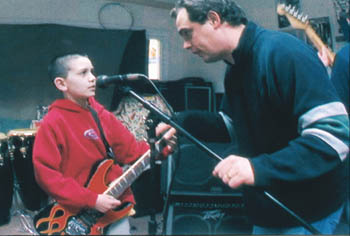![[Metroactive Movies]](/movies/gifs/movies468.gif)
[ Movies Index | Show Times | Silicon Valley | Metroactive Home | Archives ]
Drop and Give Me 50 Riffs: Hard-core teacher Paul Green puts prodigy C.J. Twoniak through his paces.
He Will Rock You
In the documentary 'Rock School,' wannabe guitar gods learn their power chords the old-fashioned way
By Richard von Busack
MY WIFE still cherishes the memory of her art teacher, famous for his curtness. Once, sizing up a student's abstract painting that failed to meet his standards, the late Sam Tchakalian commented, "That looks like shit, son. Why don't you flush it?" A question for debate: Is it better to have gentle, supportive teachers or better to have old-school, big-stick-wielding pedagogues?
As it seems from the documentary Rock School, the Paul Green School of Rock Music must have been the real-life seed for the Jack Black/Richard Linklater picture School of Rock. But after 93 minutes of Sheena M. Joyce and Don Argott's documentary, you'll miss Black's personal state of grace.
Instead, in Rock School Green gives his students the full Vince Lombardi. Green is a balding Phillie blowhard with a thick streak of self-hatred and disappointment, which he is happy to share with the world. Green is a performer, though, showing off a grotty imitation right at the film's beginning—a saliva-spraying rendition of the maniac Buffalo Bill in the "basket scene" in The Silence of the Lambs.
Among his pupils is one star student, a driven young guitarist of about age 10 named C.J. Twoniak, who does his spirited cover of "Black Magic Woman" over the credits. "C.J. is going to make us a lot of money," claim his parents, a little frighteningly.
The rest of Green's students get a lot of attention, if often of the negative variety. Of the interviewed kids, the standout is Will O'Connor, a witty, woeful self-castigator. He was a blue-baby with a few random birth defects and a tendency toward depression. O'Connor seems to be kept in the school as a kind of mascot. "A piss-poor musician," Green snipes. Then, when the Philadelphia Inquirer comes to write a puffy story about the school, Green sells out O'Connor for a gag—claiming that there is an award named in his honor for the student most likely to commit suicide.
Rock School is stylistically simple, a return to the basicness of Don't Look Back. Yet you don't always get the sense of candor. Green dominates the field, and he always seems in control of what we're seeing, even when he's blowing his stack. Any documentary raises the question of whether a camera worsens a tense situation. Rock School leaves little doubt.
Green does things that are plainly playing for the camera. Some of them are comic, like rousing the kids about to do an Ozzy Osbourne set. ("Do you love Satan?" he urges them, trying to get them in the Black Sabbath spirit.) More of them are just cruel, such as rousting a bedroom full of his poor jet-lagged students, like a drill sergeant at boot camp.
I sincerely admire Green for refusing to let all the superficial indicators of happiness—a marriage, a new baby, a nice house in the suburbs—interfere with his essential negativity and anger. Green is a rock fan in a musical world where hip-hop has taken over. He is like those old jazz musicians infuriated at the rise of that vulgar pelvis-wiggling Elvis Presley.
One of Green's most talented students is Madi; she has a side band from church, a Quaker ensemble called the Friendly Gangstas, led by one Funk Master Friendly. Their music is rather unfortunate. Still, Green's massive scorn for these harmless farm boys may be more due to hip-hop itself than for the way they perform it.
Green's wife tells us that he was a brilliant musician who floored her with his talent. But when Green plays the guitar, all we hear is a competent version of the solo in "Red House." It's too bad we couldn't have heard a little of what Green sounded like in his prime.
Rock School has an upbeat ending. The school's A-team heads for Germany to play at an annual Frank Zappa festival in Bad Doberan, near Rostock on the Baltic Sea. After being stuck in the school's narrow hallways with a raving Paul Green, the summery haze feels like a cool breeze in the theater. And of course it's touching to see a street-corner bronze bust of Zappa, wreathed with wildflowers.
The concert is a success. Napoleon Murphy-Brown, longtime sideman for Zappa, sits in with the Green-led all-stars. As the young students measure up to Zappa's ornate obbligato, it's easy to forgive Green's rage-ball tendencies. The group even get teary-eyed congratulations from ex-Mother of Invention Jimmy Carl Black ("the Indian of the group," as Zappa used to introduced him onstage).
Green's method works, sometimes, but is it feasible for everyone? There's no easy answer. Some never-were musicians can't help having a fascination with Green's temper, thinking, "If I'd had a teacher who had really kicked my ass, maybe I would have accomplished something."
[ Silicon Valley | Metroactive Home | Archives ]
![]()

Photograph by Don Argent
Rock School (Unrated; 93 min.), a documentary by Don Argott, opens Friday at selected theaters.
Send a letter to the editor about this story to letters@metronews.com.
From the June 1-7, 2005 issue of Metro, Silicon Valley's Weekly Newspaper.